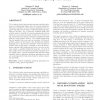Free Online Productivity Tools
i2Speak
i2Symbol
i2OCR
iTex2Img
iWeb2Print
iWeb2Shot
i2Type
iPdf2Split
iPdf2Merge
i2Bopomofo
i2Arabic
i2Style
i2Image
i2PDF
iLatex2Rtf
Sci2ools
125
click to vote
SAC
2000
ACM
2000
ACM
A Weighted Coding in a Genetic Algorithm for the Degree-Constrained Minimum Spanning Tree Problem
The coding by which chromosomes represent candidate solutions is a fundamental design choice in a genetic algorithm. This paper describes a novel coding of spanning trees in a genetic algorithm for the degree-constrained minimum spanning tree problem. For a connected, weighted graph, this problem seeks to identify the shortest spanning tree whose degree does not exceed an upper bound k ≥ 2. In the coding, chromosomes are strings of numerical weights associated with the target graph’s vertices. The weights temporarily bias the graph’s edge costs, and an extension of Prim’s algorithm, applied to the biased costs, identifies the feasible spanning tree a chromosome represents. This decoding algorithm enforces the degree constraint, so that all chromosomes represent valid solutions and there is no need to discard, repair, or penalize invalid chromosomes. On a set of hard graphs whose unconstrained minimum spanning trees are of high degree, a genetic algorithm that uses this coding...
Related Content
| Added | 01 Aug 2010 |
| Updated | 01 Aug 2010 |
| Type | Conference |
| Year | 2000 |
| Where | SAC |
| Authors | Günther R. Raidl, Bryant A. Julstrom |
Comments (0)

